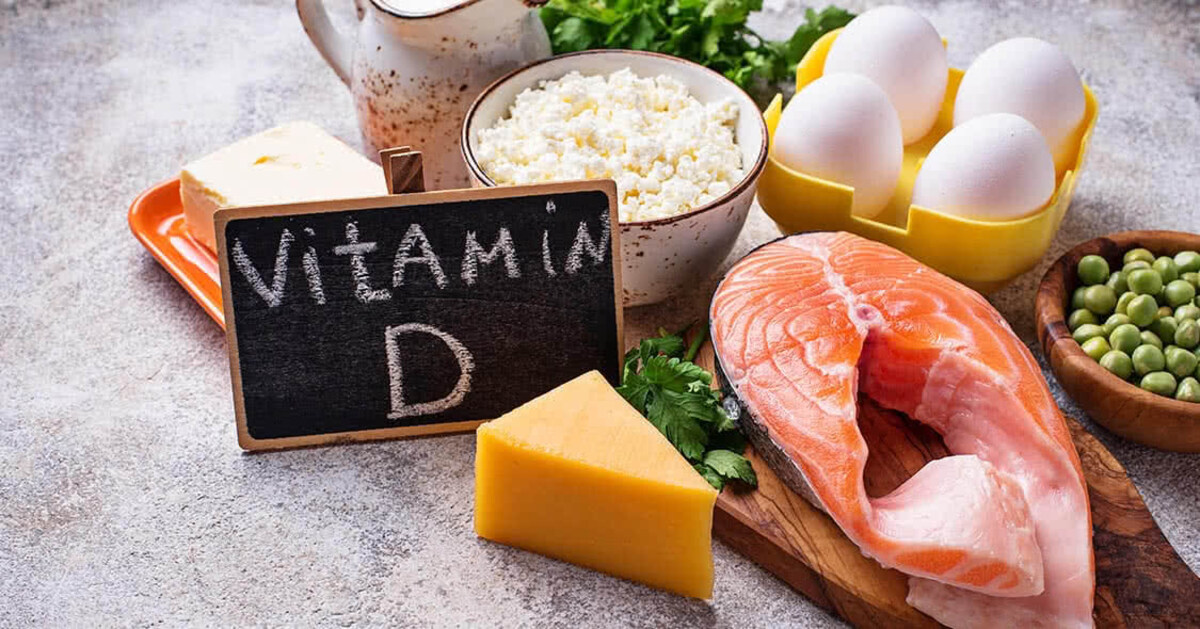Home>Misc>Featured>Which Deficiency Affects Athletic Performance


Featured
Which Deficiency Affects Athletic Performance
Modified: August 19, 2023
Discover how the featured deficiency impacts athletic performance and learn how to overcome it for better results. Boost your performance now!
Introduction
Athletic performance is a combination of various factors, including training, nutrition, and overall health. When it comes to nutrition, ensuring that the body receives adequate vitamins and minerals is crucial for optimal performance. Vitamin deficiencies can have a significant impact on an athlete’s ability to perform at their best.
It is important to note that athletes have higher nutritional needs compared to the general population due to the increased physical demands they place on their bodies. The intense training and exercise routines can deplete the body of essential nutrients, making it necessary to pay close attention to nutrient intake.
Vitamins and minerals play a vital role in numerous bodily functions, such as energy production, muscle contraction, immune function, and tissue repair. When a deficiency occurs, these functions can be impaired, leading to decreased performance and increased risk of injury.
In this article, we will explore some common vitamin deficiencies that can affect athletic performance and discuss their implications. By understanding these deficiencies and their impact on the body, athletes and their coaches can make informed decisions about their diet and supplementation to optimize performance and overall well-being.
Vitamin Deficiencies
Vitamins are essential micronutrients that our bodies need in small amounts to function properly. They are involved in numerous physiological processes and are crucial for energy production, immune function, and the maintenance of overall health. When an athlete lacks certain vitamins, it can have a detrimental impact on their athletic performance.
There are several common vitamin deficiencies that athletes should be aware of. These include deficiencies in vitamin D, vitamin B12, vitamin C, and vitamin E, among others. Each of these vitamins plays a unique role in the body, and their deficiencies can manifest in different ways.
Vitamin D deficiency, for example, is prevalent among athletes, especially those who train indoors or live in regions with limited sunlight. This vitamin is responsible for maintaining strong bones, regulating calcium levels, and supporting immune function. A deficiency in vitamin D can lead to decreased bone density, muscle weakness, and an increased risk of stress fractures.
Vitamin B12 deficiency is another common issue, particularly among athletes who follow restrictive diets or have limited meat intake. Vitamin B12 is essential for red blood cell production and nerve function. Without adequate vitamin B12, athletes may experience fatigue, weakness, and decreased endurance.
Vitamin C deficiency can impair collagen synthesis, which plays a crucial role in connective tissue health. Athletes with low levels of vitamin C may experience slow wound healing, increased susceptibility to injuries, and compromised immune function.
Vitamin E is a powerful antioxidant that helps protect cells from damage caused by free radicals. It is particularly important for athletes as intense exercise can produce an excessive amount of free radicals. A deficiency in vitamin E can lead to muscle weakness, impaired muscle recovery, and decreased endurance.
It is important for athletes to be aware of these potential deficiencies and take proactive measures to ensure adequate vitamin intake. This includes consuming a well-rounded diet that includes a variety of vitamin-rich foods, as well as considering supplementation when necessary. Regular blood testing can also help athletes identify and address any deficiencies they may have.
By addressing vitamin deficiencies, athletes can improve their overall health, enhance their performance, and reduce the risk of injuries. Proper nutrition should be a foundational component of every athlete’s training regimen.
Iron Deficiency
Iron is an essential mineral that plays a crucial role in transporting oxygen throughout the body. It is a key component of hemoglobin, the protein in red blood cells responsible for carrying oxygen from the lungs to the muscles and organs. Iron deficiency, also known as anemia, is a common nutritional concern among athletes and can have a significant impact on athletic performance.
Athletes, especially those participating in endurance sports, are at a higher risk for iron deficiency due to the increased demand for oxygen during physical activity. The body needs an adequate supply of iron to support the production of red blood cells. When iron stores are depleted, the body’s ability to deliver oxygen to working muscles is compromised, leading to fatigue, decreased endurance, and decreased performance.
Iron deficiency can manifest in various ways, including fatigue, weakness, shortness of breath, and decreased exercise tolerance. Athletes may also experience an increased heart rate and decreased recovery time following exertion. Additionally, iron deficiency can impair immune function, making athletes more susceptible to illness and infection.
It is important for athletes to be vigilant about their iron intake and take steps to prevent iron deficiency. This includes consuming iron-rich foods such as lean meats, beans, fortified cereals, and dark leafy greens. Vitamin C can enhance iron absorption, so pairing foods rich in vitamin C with iron-rich foods is beneficial. However, it’s worth noting that vegetarian and vegan athletes may need to pay extra attention to their iron intake as plant-based sources of iron are less readily absorbed by the body.
In some cases, athletes may need to supplement their iron intake under the guidance of a healthcare professional. Iron supplements can be effective in correcting iron deficiency; however, they should only be taken as directed, as excessive iron intake can lead to toxicity.
Regular blood tests can help athletes monitor their iron levels and identify any deficiencies early on. This is especially important for female athletes, who are more prone to iron deficiency due to menstrual blood loss.
By addressing iron deficiency, athletes can improve their energy levels, endurance, and overall performance. Ensuring adequate iron intake is an essential part of taking care of an athlete’s nutritional needs and promoting their long-term health.
Calcium Deficiency
Calcium is a vital mineral that is primarily known for its role in maintaining strong bones and teeth. However, its importance goes beyond skeletal health, especially for athletes. Calcium is involved in muscle contractions, nerve function, and blood clotting. It also plays a significant role in maintaining a healthy heart rhythm and blood pressure. When athletes lack sufficient calcium, it can negatively impact their overall performance and put them at risk for various health issues.
Athletes, especially those in high-impact sports, have a higher risk of calcium deficiency due to the constant strain placed on their bones and muscles. Calcium deficiency can lead to decreased bone density, which increases the risk of stress fractures and osteoporosis, a condition characterized by weak and brittle bones.
In addition to bone health, calcium deficiency can affect muscle function. Calcium ions are needed for muscle contractions, and when calcium levels are low, muscle weakness and cramping can occur. This can impair an athlete’s ability to perform at their best and may lead to a higher risk of injuries.
Calcium deficiency can also disrupt normal nerve function. Nerves rely on calcium ions to transmit signals throughout the body. When calcium levels are inadequate, nerve impulses can be less efficient, leading to decreased reaction times and coordination.
Ensuring adequate calcium intake is vital for athletes, especially those who restrict dairy or have lactose intolerance. While dairy products such as milk, cheese, and yogurt are excellent sources of calcium, there are also other calcium-rich options available. Leafy green vegetables like kale and broccoli, fortified soy and almond milk, and canned fish with edible bones like sardines are all good sources of calcium.
It’s important to note that vitamin D is necessary for the body to absorb and utilize calcium effectively. Vitamin D helps the intestines absorb calcium and promotes its deposition in bones. Therefore, it’s beneficial for athletes to ensure they have adequate vitamin D levels, either through sun exposure or supplementation, to maximize calcium absorption and utilization.
If an athlete suspects they have a calcium deficiency, they should consult with a healthcare professional and possibly undergo a blood test to determine their calcium levels. In some cases, calcium supplements may be recommended to help correct the deficiency.
By maintaining sufficient calcium levels, athletes can support bone health, muscle function, and overall performance. Including calcium-rich foods in their diet and addressing any deficiencies are essential steps in optimizing an athlete’s long-term health and athletic success.
Vitamin D Deficiency
Vitamin D, often referred to as the “sunshine vitamin,” is unique because it can be synthesized by the body when the skin is exposed to sunlight. However, despite this ability, vitamin D deficiency is still a prevalent issue, especially among athletes. Vitamin D plays a crucial role in numerous physiological processes, and its deficiency can have a significant impact on athletic performance and overall health.
One of the primary functions of vitamin D is maintaining healthy bones. It aids in the absorption of calcium and phosphorus, essential minerals for bone strength. Athletes who are deficient in vitamin D may be at a higher risk of stress fractures and bone fractures due to weakened bones. In addition, low vitamin D levels can hinder muscle function and recovery, leading to decreased performance and increased muscle soreness.
Vitamin D also plays a crucial role in immune function. It supports the production and activation of immune cells, helping the body fight off infections and reducing the risk of illness. Athletes with vitamin D deficiency may experience frequent illnesses, prolonged recovery periods, and compromised immune responses.
Moreover, vitamin D deficiency has been linked to reduced muscle strength and power. This can negatively impact an athlete’s performance in explosive movements, such as sprinting and jumping. Additionally, low vitamin D levels have been associated with decreased endurance and increased muscle fatigue.
Athletes who spend a significant amount of time training indoors or in regions with limited sunlight are more susceptible to vitamin D deficiency. Also, individuals with darker skin pigmentation have reduced vitamin D synthesis from sunlight exposure and may require higher levels of supplementation.
It is important for athletes to ensure they obtain adequate vitamin D through a combination of sunlight exposure and dietary sources. Foods such as fatty fish (e.g., salmon, mackerel), fortified dairy products, and eggs are good sources of vitamin D. However, it can be challenging to meet the recommended daily intake through diet alone, especially for those with limited sun exposure.
If an athlete suspects they have a vitamin D deficiency, it is crucial to consult with a healthcare professional for proper evaluation and guidance. A blood test can help determine vitamin D levels, and supplementation may be recommended to correct any deficiencies.
Optimizing vitamin D levels can improve bone health, muscle function, immune function, and overall performance for athletes. Regular sun exposure, along with appropriate dietary choices and supplementation when necessary, can help maintain optimal vitamin D levels and support an athlete’s long-term wellbeing.
Magnesium Deficiency
Magnesium is a mineral that plays a crucial role in several physiological processes that are essential for athletic performance. It is involved in energy production, muscle function, protein synthesis, and nerve transmission. Unfortunately, magnesium deficiency is a common issue among athletes and can have a significant impact on their overall health and performance.
Magnesium deficiency can lead to a range of symptoms that can hinder athletic performance. Muscle cramps and spasms are commonly associated with magnesium deficiency, as magnesium plays a key role in muscle contraction and relaxation. Athletes may experience increased muscle tightness, reduced flexibility, and decreased athletic performance as a result.
Furthermore, magnesium deficiency can affect energy metabolism and recovery. Magnesium is involved in the production of adenosine triphosphate (ATP), which is the primary source of energy for our cells. Without adequate magnesium, energy production can be impaired, leading to decreased stamina, increased fatigue, and longer recovery times.
Magnesium is also crucial for protein synthesis, which is essential for muscle repair and growth. Deficiencies in magnesium can hinder the body’s ability to repair muscle tissue effectively, resulting in delayed recovery and increased vulnerability to muscle injuries.
Additionally, magnesium deficiency can impact the functioning of the nervous system. Magnesium plays a role in nerve transmission, including the regulation of neurotransmitters and the maintenance of a healthy nervous system. Inadequate magnesium levels can disrupt nerve signals, affecting coordination, reaction time, and overall athletic performance.
Athletes who engage in intense and prolonged physical activity are at a higher risk of magnesium deficiency due to increased magnesium loss through sweat and urine. Furthermore, some factors, such as high sugar and alcohol intake, certain medications, and gastrointestinal disorders, can interfere with magnesium absorption and contribute to deficiency.
Ensuring adequate magnesium intake is essential for athletes. Good dietary sources of magnesium include green leafy vegetables, nuts and seeds, whole grains, and legumes. Athletes may also consider magnesium supplementation, especially when deficiencies are confirmed through blood tests.
However, it’s important to note that excessive magnesium intake can lead to adverse effects, so it’s crucial to consult with a healthcare professional to determine the appropriate dosage if supplementation is necessary.
Addressing magnesium deficiency can improve muscle function, energy production, recovery, and overall athletic performance. Including magnesium-rich foods in the diet and considering supplementation when needed are essential steps to support optimal magnesium levels and enhance an athlete’s wellbeing.
Zinc Deficiency
Zinc is an essential mineral that plays a crucial role in various physiological processes, including immune function, protein synthesis, and wound healing. It is also involved in the regulation of hormones and supports optimal growth and development. However, zinc deficiency is a common concern among athletes and can have a significant impact on their overall health and performance.
Zinc deficiency can impair immune function, making athletes more susceptible to illnesses and infections. The immune system relies on zinc for the activation and function of immune cells. Without sufficient zinc, the body’s ability to fight off pathogens and recover from intense training can be compromised, leading to more frequent illnesses and prolonged recovery periods.
Zinc is also critical for protein synthesis, which is essential for muscle repair, recovery, and growth. Adequate zinc levels support the body’s ability to convert dietary protein into muscle tissue. When zinc deficiency occurs, muscle repair and growth can be hampered, resulting in prolonged muscle soreness, decreased strength, and compromised athletic performance.
In addition to its immune and muscle-related functions, zinc is involved in hormone regulation. It plays a role in the production and regulation of various hormones, including testosterone. Low levels of zinc can lead to decreased testosterone levels, which may result in reduced muscle strength, endurance, and overall athletic performance.
Furthermore, zinc deficiency can impair wound healing, which is crucial for athletes dealing with injuries or even minor cuts and bruises. Zinc is involved in various aspects of the wound healing process, including collagen synthesis, cellular repair, and immune response. Insufficient zinc levels can delay the healing process, leading to longer recovery times and disruption in training schedules.
Athletes who participate in high-intensity or endurance sports are at a higher risk of zinc deficiency due to increased zinc loss through sweat and urine during exercise. Additionally, restrictive diets, such as those low in animal products, can contribute to inadequate zinc intake.
It is important for athletes to ensure they have sufficient zinc levels in their diet. Good dietary sources of zinc include lean meats, seafood, poultry, legumes, nuts, and seeds. Supplementation may be considered if a deficiency is confirmed through blood tests; however, it is essential to consult with a healthcare professional to determine the appropriate dosage.
By addressing zinc deficiency, athletes can support immune function, muscle repair, hormone regulation, and wound healing. Including zinc-rich foods in the diet and attending to any deficiencies are essential steps in optimizing zinc levels and promoting overall health and athletic performance.
Conclusion
Understanding the impact of vitamin and mineral deficiencies on athletic performance is crucial for athletes and their coaches. Nutritional deficiencies can have profound effects on energy levels, muscle function, immune function, and overall well-being. By addressing these deficiencies, athletes can optimize their performance, reduce the risk of injuries, and enhance their long-term health.
Vitamin and mineral deficiencies, such as iron, calcium, vitamin D, magnesium, and zinc, are commonly encountered among athletes. Iron deficiency can lead to fatigue and decreased endurance, while calcium deficiency can weaken bones and muscles. Vitamin D deficiency can impair muscle function and compromise immune function. Magnesium deficiency can result in muscle cramps and hinder energy production. Lastly, zinc deficiency can weaken the immune system and impair muscle repair and hormone regulation.
To prevent and address these deficiencies, athletes should focus on consuming a well-rounded diet that includes a variety of nutrient-rich foods. Lean meats, fish, dairy products, fruits, vegetables, legumes, and whole grains should be incorporated into their meals. Athletes may also consider supplementation when advised by healthcare professionals and supported by blood tests.
Regular monitoring of nutrient levels through blood tests is crucial for athletes, especially those who follow restrictive diets or experience symptoms of deficiencies. This allows for early detection and targeted intervention, ensuring optimal nutrient intake and performance. It is important to work with healthcare professionals, such as dietitians or sports physicians, to develop individualized nutritional plans that meet the specific needs of each athlete.
Athletes should also be mindful of lifestyle factors that can affect nutrient absorption and utilization. Adequate sun exposure for vitamin D synthesis, proper hydration, and avoidance of excessive alcohol and sugary drinks are important considerations for overall health and nutrient balance.
In conclusion, addressing vitamin and mineral deficiencies is paramount for athletes aiming to perform at their best. By ensuring adequate nutrient intake, athletes can optimize their energy levels, enhance their physical performance, support muscle repair and growth, boost immune function, and reduce the risk of injuries. A comprehensive approach to nutrition that takes into account individual needs and includes regular monitoring is crucial for maintaining optimal health and achieving athletic success.









